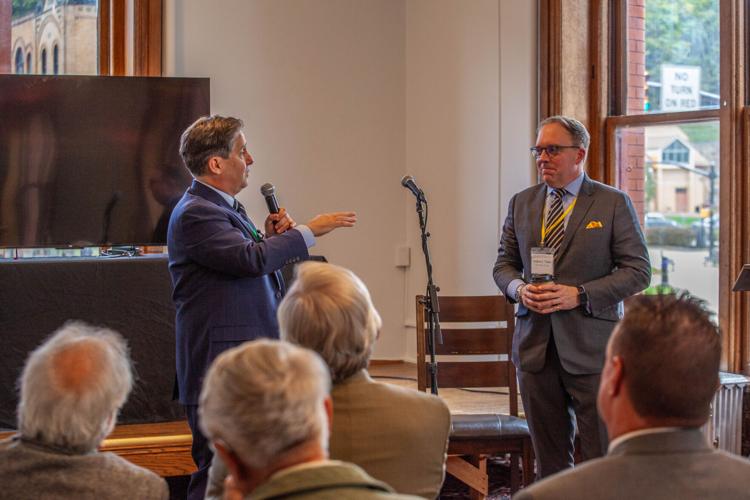In marking its third return appearance to the region, the Drake Energy & Climate Security Conference drew a wide spread of industry experts and policymakers in October for a two-day forum that covered everything from local oil history to globe-spanning energy issues.
In a mix of sightseeing and deep policy discussion, the Oct. 14 and 15 conference was titled “At the Crossroads: Navigating America’s Energy & Climate Dilemmas”.
The conference was started in 2022 with the goal of bringing experts together to discuss current issues impacting energy and climate security, as well as to remember the rich history the area holds as the birthplace of the American oil industry.
In 2024, the Drake Energy Security Forum became registered as a nonprofit in Pennsylvania. The event was co-founded by 1990 Oil City Area High School graduate, former U.S. official, Middle East expert and author Andrew Tabler.
The Security Forum collaborated on last year’s program with the Venango Area Chamber of Commerce; the Oil Region Alliance of Business, Industry and Tourism; and with the facilitation of Hind Karns, Clarion County Economic Development Corp. tourism director and Oil City resident.
On day one, attendees toured locations across Oil City and heard presentations on a variety of topics.
Events in Oil City were held at Oil Region Venango Campus (formerly PennWest Clarion-Venango), 100 Seneca and the National Transit Building.
100 Seneca held particular significance for the conference as it was the former site of the Oil City Oil Exchange, where the worldwide price of oil was set for about 40 years and the system for pricing oil — which is still in use today — was developed.
Attendees gathered in the National Transit Building’s Great Room — once the office of Standard Oil purchaser Joseph Seep — to hear from Robert McNally, author of “Crude Volatility — The History and the Future of Boom-Bust Oil Prices”.
During his presentation, McNally described how the book took him on a deep dive into local oil history, leading him to research how the oil prices were set in Oil City from the 1860s to the 1890s, for which he utilized early oil publications from The Derrick in his research.
A display in the National Transit Building showcased the history of The Derrick, known by many of the time as “The Organ of Oil”. The newspaper stands as one of the only sources for many statistics and accounts of the early oil industry.
The conference wrapped up the next day at Drake Well Museum and Park in Titusville with “Drake Dialogues,” an invitation-only event that featured discussions and presentations on the energy industry’s future, which was taking place in the exact spot many consider its origin.
National Security Council Director of Energy Security Steven Burns, a Titusville native, gave the keynote address.
Over the course of the day, attendees also heard from BP America Chief Economist Michael Cohen, who attended virtually, and Elur Soltanov, chief executive officer of COP 29 in Azerbajian, who addressed the forum in a pre-recorded video.
Tabler moderated a fireside chat with John Podesta, senior adviser to the president for international climate policy, who attended virtually.
Over lunch, American Petroleum Institute-Pennsylvania Executive Director Stephanie Catarino Wissman spoke about the institute’s founding of Drake Well Museum in 1934.
After lunch, CNX Resources Chief Executive Officer Nick Deluliis gave an address.
The bulk of the day was composed of six panel discussions on topics related to energy and climate security, including the implications of the Inflation Reduction Act.
Some of the themes that emerged were the incalculability of costs for a full transition to renewable energy; concerns surrounding the nation’s power grid becoming increasingly unreliable; and political, national security and international ramifications of the topics covered.
The day ended with a reception and excursion aboard the Oil Creek and Titusville Railroad from Drake Well to a dinner at Titusville Iron Works Tap House.
Presenters and invitees included representatives from research, industry, governments and local communities.
Some attendees and presenters included Ed Chow, senior associate in the Energy Security and Climate Change Program; Brenda Shaffer, an energy expert and professor at the U.S. Naval Postgraduate School; Michael Ratner, international energy lead with the Congressional Research Service; Victoria Coates, senior fellow with The Heritage Foundation and former deputy national security adviser and senior adviser with the U.S. Department of Energy; then-U.S. Sen. Bob Casey; then-Senate candidate Dave McCormick; U.S. Rep. Mike Kelly; Ambassador (retired) James Jeffrey, chair of the Middle East Program, Wilson Center; Dhabia al-Mohannadi, assistant professor in chemical engineering at Texas A&M University at Qatar; Robert Johnston, executive director at the Center on Global Energy Policy at Columbia University; Diana Furchtgott-Roth, director, Center for Energy, Climate, and Environment, Heritage Foundation; Andre Beliveau, senior manager of energy policy, Commonwealth Foundation; Raad al-Kadiri, nonresident senior associate, CSIS; Landon Derentz, Atlantic Council; George Coates, chairman of the board of the Commonwealth Foundation; officials from Azerbaijan and Qatar; and representatives from Exxon Mobil Corp., BP, CNX Corp. and the American Petroleum Institute.















































